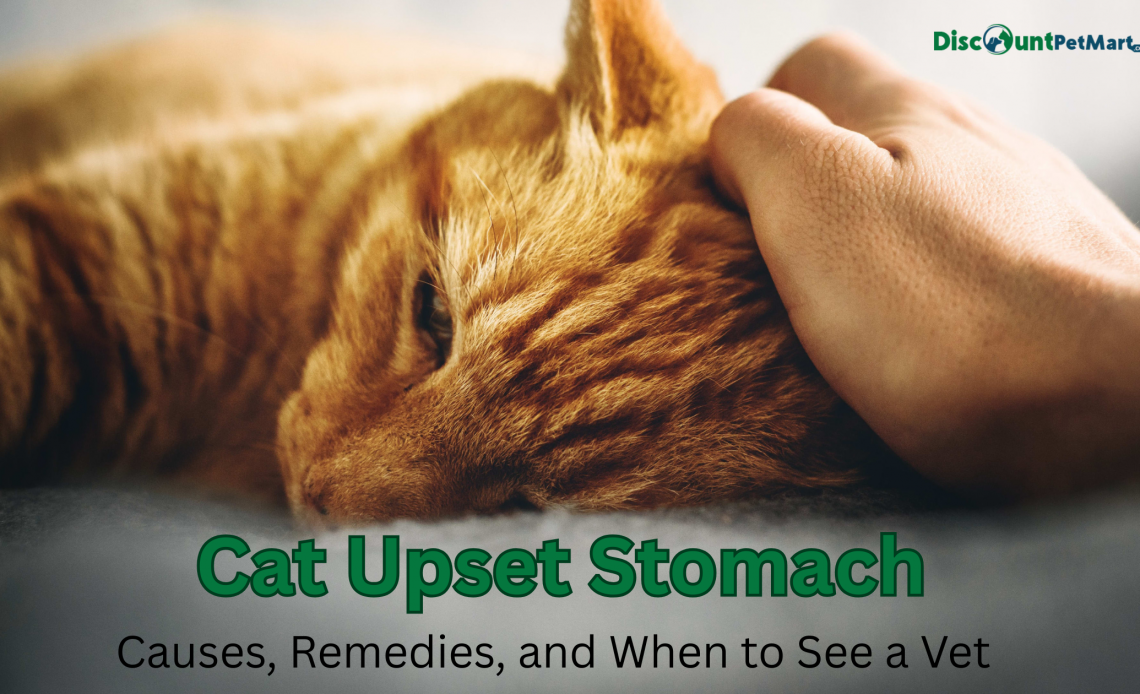
“There can be no happiness without good health.”
A healthy digestive system is key to a cat’s overall well-being. However, many cats experience upset stomachs due to diet changes, parasites, infections, or even simple hairball ingestion. While a cat upset stomach can sometimes resolve on its own, persistent symptoms may point to underlying health issues that need veterinary care.
In this guide, we’ll explore the causes, symptoms, home remedies, and treatments for cat stomach problems, so you can provide the right care for your furry friend.
Common Causes of Cat Upset Stomach
- Internal Parasites
Cats infected with worms often develop a swollen belly, diarrhea, vomiting, and even anemia. Parasite infestations are one of the leading causes of digestive issues in cats. - Infectious Diseases
Conditions like feline panleukopenia can cause diarrhea with blood, vomiting, fever, loss of appetite, and dehydration. These cases require immediate veterinary attention. - Dietary Indiscretion
Cats are curious eaters. Consuming spoiled food, toxic plants, or indigestible items (like hairballs) can irritate the stomach, leading to vomiting, gagging, or restlessness. - Inflammatory Bowel Disease (IBD)
Chronic soft stools, diarrhea, weight loss, and poor coat condition are often linked to IBD, a long-term digestive disorder in cats. - Food Allergies or Intoxication
Some cats develop hypersalivation, vomiting, or even bleeding after ingesting food they are allergic to or toxic substances.
Symptoms of Cat Upset Stomach to Watch Out For
- Swollen or bloated belly
- Vomiting (with or without hairballs)
- Diarrhea or bloody stool
- Excessive drooling (hypersalivation)
- Lethargy and loss of appetite
- Weight loss or poor coat health
- Abdominal discomfort
Home Remedies for Mild Upset Stomach in Cats
If symptoms are mild and last less than 24–48 hours, you can try simple remedies:
Hydration: Ensure your cat always has access to fresh, clean water. Dehydration can worsen stomach problems.
Chamomile Tea Infusion: Chamomile has soothing, anti-inflammatory properties. Offer in small amounts only if tolerated. Stop immediately if vomiting occurs.
Bland Diet: Feed small portions of easily digestible food (like plain boiled chicken or vet-recommended gastrointestinal diets).
Clean Environment: Maintain a clean litter box and calm surroundings to reduce stress.
Gentle Care: Provide warmth and, if tolerated, light belly massages to ease discomfort.
When to See a Vet
You should consult a veterinarian if your cat:
- Shows persistent vomiting or diarrhea beyond 48 hours
- Has bloody stool or vomit
- Refuses food and water
- Appears lethargic or weak
- Has recurring upset stomach issues
Early diagnosis is crucial since stomach problems may signal serious conditions like parasites, infections, or IBD.
Final Thoughts
A cat upset stomach can be uncomfortable but is often manageable with proper care. Monitor your cat closely, try safe home remedies for minor issues, and always seek veterinary advice if symptoms persist.
By understanding the causes, recognizing the symptoms, and acting quickly, you can keep your feline companion healthy and happy.
FAQs
Q1. What causes a cat upset stomach?
A cat upset stomach may be caused by parasites, infections, dietary changes, food allergies, or ingestion of hairballs or toxins.
Q2. What can I give my cat for an upset stomach at home?
You can offer fresh water, bland food like boiled chicken, or small amounts of chamomile infusion (if tolerated). Always consult a vet before giving any medication.
Q3. When should I worry about my cat’s upset stomach?
If vomiting, diarrhea, or loss of appetite lasts more than 48 hours, or if there is blood in stool or vomit, consult a veterinarian immediately.
Q4. Can worms cause a cat upset stomach?
Yes, intestinal worms are a common cause of upset stomach, bloating, diarrhea, and weight loss in cats. Regular deworming treatments helps prevent this.
Q5. Is diarrhea in cats always serious?
Not always. Mild diarrhea may resolve with diet adjustments, but persistent or bloody diarrhea needs prompt veterinary care.

